I consume a tremendous amount of content every week – books, blogs, news sites, podcasts, Netflix, YouTube videos, Twitter, music, and even magazines. Each has it’s benefits of course, but there’s just something special about books.
I find that books are, in general, of a much higher quality than other media. This increased quality is probably due to the fact that so much time, effort, and money go into researching, writing, editing, and publishing a book. The number of people and perspectives probably plays a large role too.
What Makes For Good Strategy Books?
Sadly, there are only a handful of books that are explicitly focused on strategy. Many of those are garbage – mostly because they were written in order to sell some new fad or business “secret.” That means that some of the best books about strategy aren’t explicitly about strategy at all.
When I’m considering a book for this list, I’m looking for content that’s rooted in sound theory, backed by evidence, and applicable to a multitude of real-world problems. As a result, books about baseball, economics, mythology, entrepreneurship, and even cooking make (or will make) the list.
Anyway. What follows are what I think are the best strategy books. Check back for additions and updates! Check out my list of best entrepreneurship books too.
HBR’s 10 Must Reads on Strategy
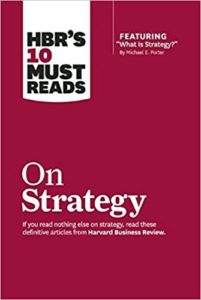 This book is a collection of articles from Harvard Business Review (HBR). The lead article, What is Strategy? by Micheal Porter, is probably the most widely read piece ever written on strategy (with the possible exception of Sun Tzu’s classic, The Art of War).
This book is a collection of articles from Harvard Business Review (HBR). The lead article, What is Strategy? by Micheal Porter, is probably the most widely read piece ever written on strategy (with the possible exception of Sun Tzu’s classic, The Art of War).
If you can only read one, this is the best strategy book out there. You’ll get an overview of the fundamentals including: Many descriptions of strategy (I contend here, that Porter never actually defines strategy), what strategy is not, the five competitive forces, how vision & values relate to strategy, how to avoid the innovator’s dilemma, blue ocean strategy, and several articles on how to actually execute your strategy.
While HBR’s 10 Must Reads on Strategy isn’t perfect or complete, at 248 pages, it is the most complete strategy book out there.
Strategy: A History
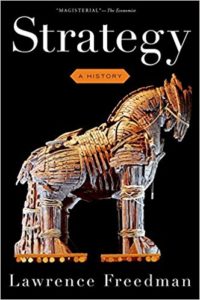 If you could only take one strategy book to a desert island, this would definitely be the one. Why? Because it’s almost 800 pages which you could read to stay entertained and then burn to keep warm.
If you could only take one strategy book to a desert island, this would definitely be the one. Why? Because it’s almost 800 pages which you could read to stay entertained and then burn to keep warm.
In all seriousness, Strategy: A History is the most comprehensive book on the history of strategy that has ever been written. Author Lawrence Freedman begins his march through the history of strategy with primitive man and ends just a few years before the Trump era. His twitter feed is also biting and witty in that uniquely British way.
“A brilliant overview of the most prominent strategic theories in history, from David’s use of deception against Goliath, to the modern use of game theory in economics, this masterful volume sums up a lifetime of reflection on strategy.”
If you’re interested in the history of Strategy, I highly recommend the audio version – a whopping 32 hours of content.
Getting To Yes
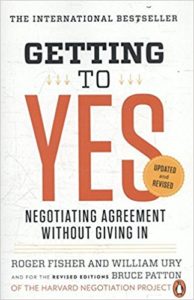 Getting to Yes is one of the most important books I’ve ever read. I’ve re-read this 80 page book at least once every year since it was recommended to me over 5 years ago.
Getting to Yes is one of the most important books I’ve ever read. I’ve re-read this 80 page book at least once every year since it was recommended to me over 5 years ago.
The subtitle is “Negotiating Agreement Without Giving In” and the book is marketed as a negotiation book. But while negotiation is clearly the core topic, the concepts and lessons extend far beyond business or even personal negotiation. The book outlines a fool-proof strategy for resolving conflict and optimizing outcomes.
When framed properly, nearly every interaction between two or more parties involves some explicit or implicit negotiation and Getting to Yes provides readers with tools to navigate those Difficult Conversations (a similarly themed book that came out of the same group at the Harvard Negotiation Project).
This is probably the highest ROI book on this list. Getting to Yes literally helped me save one of my longest and most dear friendships, making it one of the best strategy books around.
Power: Why Some People Have It and Others Don’t
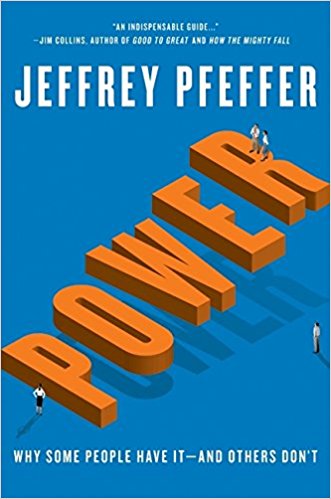 Power isn’t distributed evenly. That just seems to be a fact of life. But why do some people end up with power and others don’t? How do people acquire power? How do they keep power once they’re at the top?
Power isn’t distributed evenly. That just seems to be a fact of life. But why do some people end up with power and others don’t? How do people acquire power? How do they keep power once they’re at the top?
Power: Why Some People Have It and Others Don’t, Stanford Business Professor Jeffrey Pfeffer offers readers theoretical and practical answers to these questions. This book does a superb job of addressing both the strategy of power and specific tactics that you can implement immediately (especially chapter 7, Acting and Speaking with Power).
Power, as a subject of study, is often awkward. It highlights our differences and hierarchies. But setting aside the discomfort and addressing the topic directly is by far the best way to understand power, it’s origins, and use.
If for no other reason, Power: Why Some People Have It and Others Don’t is one of my top-recommended books because once you understand the dynamics of power better, you can defend yourself from those who may wish to subjugate you in their own quest for power.
Zero To One: Notes on Startups, or How to Build the Future
Zero to One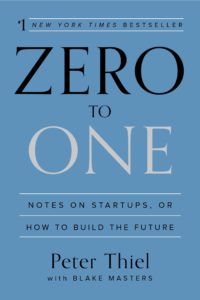 is the extension of a series of lectures that Peter Thiel gave at Stanford University in 2012. The subtitle accurately describes the content of the book: “Notes on Startups, or How to Build the Future.”
is the extension of a series of lectures that Peter Thiel gave at Stanford University in 2012. The subtitle accurately describes the content of the book: “Notes on Startups, or How to Build the Future.”
Throughout the book, Thiel lays out several major – sometimes controversial – thesis about the world, which he then applies to entrepreneurship. Topics include:
- The Future, start-ups, and their role in creating the future
- Technology vs globalization (aka vertical and horizontal progress), and why we need more technology miracles
- Definite vs indefinite attitudes and the nihilism of the indefinite
- Where Silicon Valley really went wrong (after the dot com boom and bust, not during)
- The profit-destroying power of competition and why profits are critically important for consumer choices, abundance, and generally making the world a better place
- The importance of the Power Law, from the personal, start-up, and venture fund perspectives
- The importance of sales (not just product design)
The book – while short – is packed with Thiel’s unique perspective on the world and fairly generalizable tactics and strategies for bringing about a different, future world.
If you’re interested in start-ups or considering starting your own company, Zero to One is a must read – striking a difficult balance between theory and practice, common knowledge and hard-earned secretes – all in just a few hours investment.
See also: Future